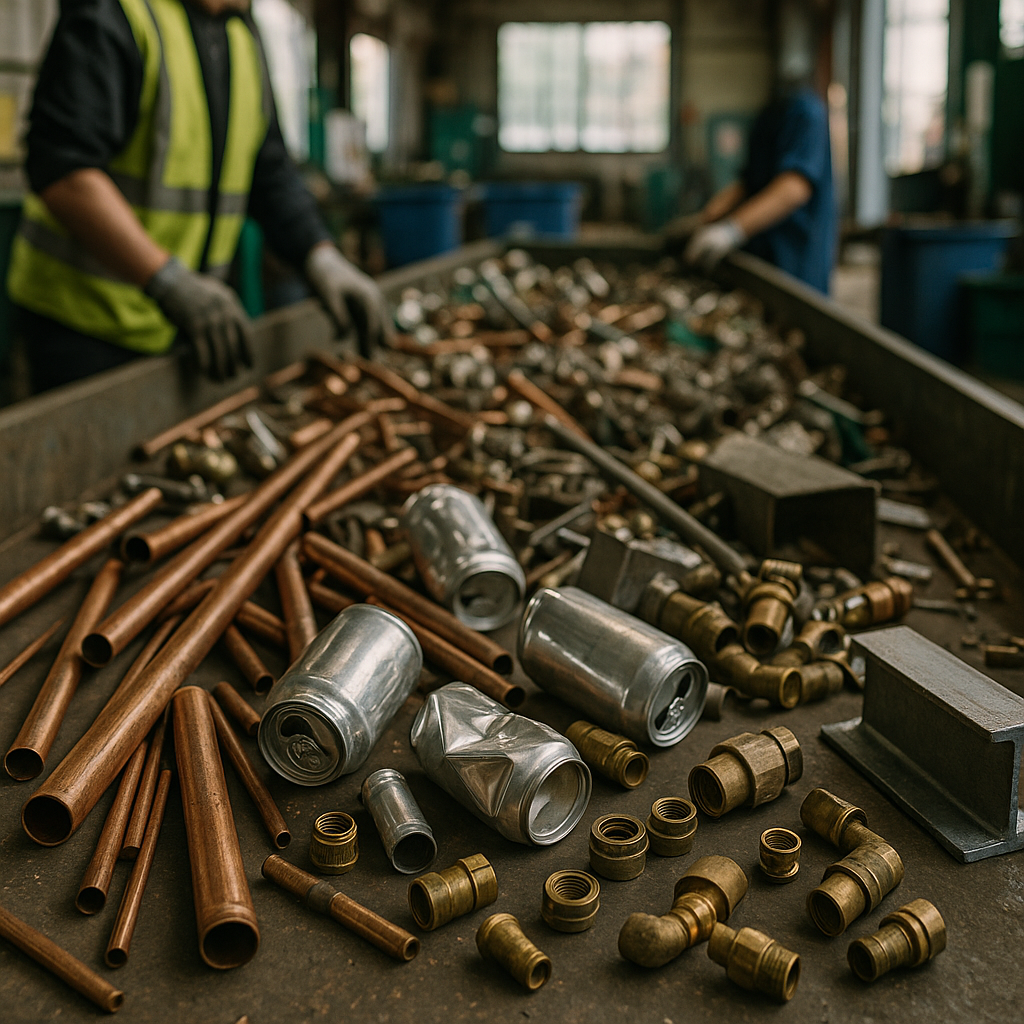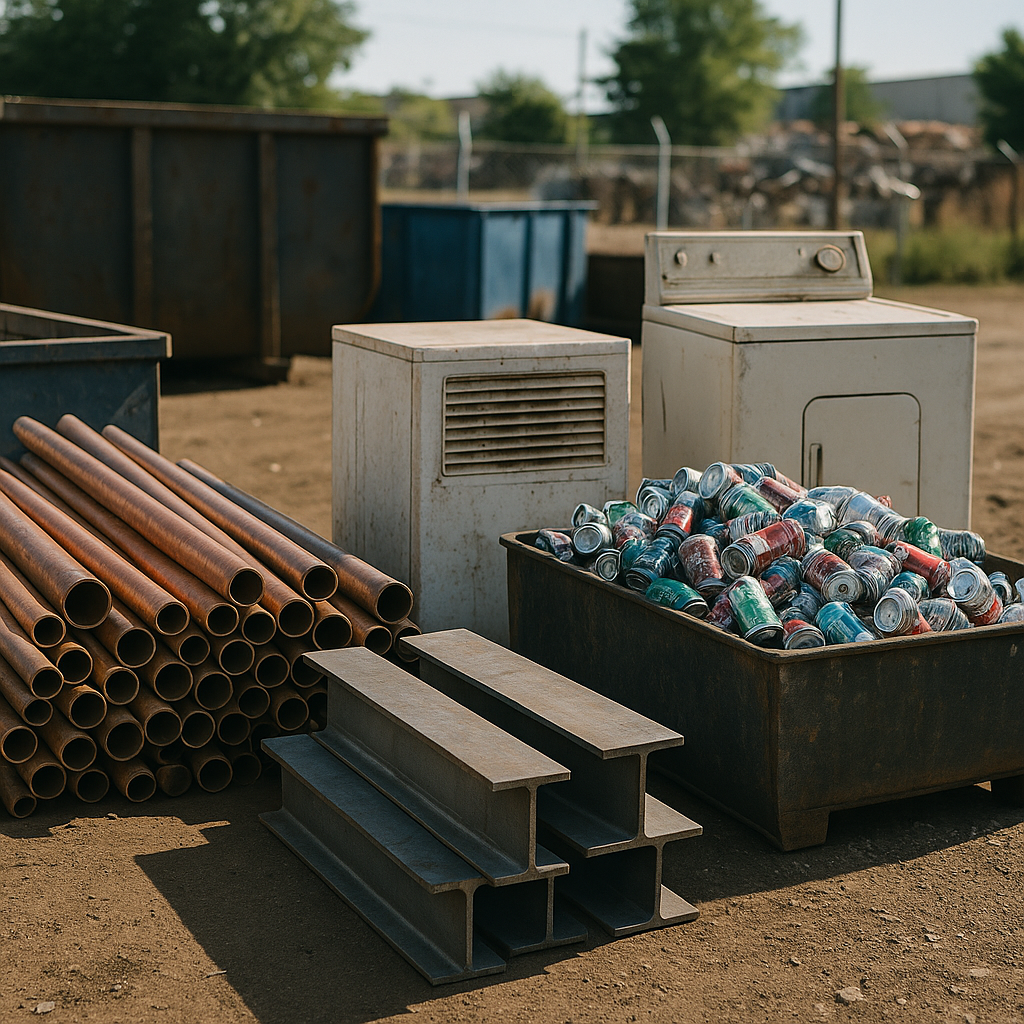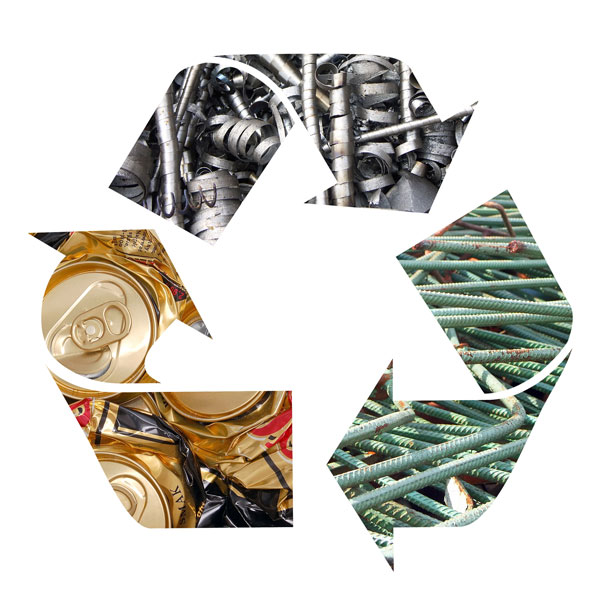5901 Botham Jean Blvd, Dallas, TX 75215
Scrap Metal Recycling Explained: Types, Benefits, and How to Get the Best Value
June 29, 2025Scrap metal recycling transforms discarded metal materials into valuable resources for new products. This sustainable practice involves collecting, sorting, and processing metal waste that would otherwise end up in landfills. From old appliances and construction debris to manufacturing byproducts, almost all metal items can be given a new life through recycling.
This process benefits both the environment and the economy. Environmentally, recycling metals conserves natural resources by reducing the need for mining virgin ores. A single ton of recycled steel saves 1.5 tons of iron ore and cuts energy consumption by up to 75% compared to producing new steel from raw materials.
Financially, scrap metal recycling creates economic opportunities for individuals and businesses. Metals retain their monetary value even after use, making them valuable commodities in the recycling market. Whether you’re a homeowner with old appliances or a business with industrial metal waste, recycling these materials can generate income while contributing to a more sustainable waste management system.
What Types of Scrap Metal Can Be Recycled?

Recycling metals typically involves two main categories: ferrous and non-ferrous. Each type has unique properties that affect its recyclability and market value.
Ferrous Metals
Ferrous metals primarily contain iron, resulting in their magnetic properties, which simplifies sorting in recycling. Commonly recycled ferrous metals include:
- Iron
- Steel
- Cast iron
These metals are sourced from household and industrial products like old appliances (refrigerators, washing machines, ovens), steel food cans, metal furniture, and automotive parts.
Non-Ferrous Metals
Non-ferrous metals do not contain iron as their main component. These are often more valuable due to their diverse applications. Common recyclable non-ferrous metals include:
- Aluminum (cans, siding, window frames)
- Copper (pipes, wiring)
- Brass (faucets, doorknobs, decorative items)
- Lead (batteries, roofing materials)
- Zinc (die-cast products)
- Nickel (industrial alloys)
The recycling of non-ferrous metals retains their specific properties, making them crucial in industries that require characteristics like electrical conductivity or corrosion resistance.
Household Items Containing Recyclable Metals
Everyday household items with recyclable metals often end up in landfills. Recognizing these items can help conserve resources. Items include:
- Kitchen appliances (toasters, blenders, microwaves)
- Plumbing fixtures (copper pipes, brass faucets)
- Electronics (computers, phones, televisions)
- Aluminum cans and foil
- Metal furniture and fixtures
- Stainless steel sinks and cookware
- Air conditioning units
- Automotive parts
Even small metal items like keys, paperclips, and bottle caps can be recycled, with a cumulative recycling impact over time.
Electronics Recycling
Modern electronics contain varied metals recoverable by recycling, such as gold, silver, platinum, copper, and aluminum. Devices like cell phones, computers, and televisions are best recycled through specialized e-waste programs.
The recycling industry employs advanced sorting techniques to separate metal types from electronic waste, maximizing material recovery and reducing environmental harm.
When preparing scrap metal for recycling, separating ferrous from non-ferrous metals enhances their value. Non-ferrous metals usually command higher prices due to their rarity and diverse uses. A simple magnet test can identify metal types: ferrous metals are magnetic, while non-ferrous metals are not.
How Do Scrap Metal Prices Work?

Scrap metal prices fluctuate due to various market forces, with today’s prices possibly differing by next week or even tomorrow. This volatility mainly results from supply and demand dynamics. When demand for a specific metal increases while supply remains stable, prices rise. Conversely, prices decrease when supply surpasses demand.
Global economic conditions significantly influence these fluctuations. During economic downturns, manufacturing and construction activities typically slow, reducing metal demand and causing scrap prices to fall. Conversely, when economies prosper, industries require more raw materials, driving scrap metal prices up.
The time of year also impacts scrap metal pricing. Prices often rise during spring and summer when the construction and automotive industries are busier. In contrast, winter usually brings lower prices due to a slowdown in these sectors and challenging weather conditions for scrap collection.
Different metals have vastly different prices based on their inherent value and market demand. Copper and aluminum generally fetch higher prices than iron and steel. For instance, #1 bare bright copper wire might sell for over $3.50 per pound, while scrap iron might only bring around $190-$205 per ton. This price difference reflects the relative scarcity and utility of these metals in manufacturing.
Location significantly impacts scrap metal pricing. Yards in metropolitan areas or near ports tend to offer better prices than those in remote locations. This price disparity reflects transportation costs—greater distances to processing facilities mean higher shipping expenses that reduce profit margins.
The international market also affects domestic scrap prices. Countries like China and India import substantial amounts of scrap metal, and changes in their import policies or demand levels can trigger global price shifts. For example, when China restricted scrap metal imports in 2019, prices dropped significantly as sellers faced surplus inventory.
Oil and gas prices directly impact scrap metal values. Recycling facilities rely on fossil fuels for equipment and material transportation. When fuel costs rise, recyclers often lower purchase prices to maintain profitability.
To secure the best price for your scrap metal, monitor price trends via industry websites and contact multiple scrap yards before selling. If prices appear unusually low and you have storage capacity, consider holding your scrap until market conditions improve—unless long-term forecasts indicate a continued decline.
What Are the Benefits of Recycling Scrap Metal?
Recycling scrap metal provides significant environmental and economic benefits. By recycling metals instead of discarding them, we notably reduce the need for environmentally harmful mining operations. This conservation of natural resources is essential for environmental protection.
Environmental Benefits
The environmental impact of scrap metal recycling is substantial. Recycling metals conserves finite natural resources and protects habitats that would otherwise be disrupted by mining activities.
Energy savings are also noteworthy. Recycling aluminum saves up to 95% of the energy needed to produce new aluminum from raw materials. Steel recycling offers similar benefits by reducing the demand for iron ore, coal, and limestone extraction.
Using recycled metals significantly decreases greenhouse gas emissions. One ton of recycled aluminum prevents approximately nine tons of carbon emissions, helping to combat climate change and improve air quality.
Reducing Landfill Waste
Metals in landfills take centuries to decompose and can contain hazardous substances like lead and mercury, which contaminate soil and groundwater.
Industry research shows that using recycled steel results in an 86% reduction in air pollution and a 76% reduction in water pollution. The recycling process also uses 40% less water compared to producing virgin metal.
Diverting metals from landfills extends their capacity and reduces the environmental risks associated with metal waste disposal. This contributes to healthier ecosystems and communities.
Financial Incentives
In addition to environmental benefits, scrap metal recycling offers substantial economic advantages. Individuals and businesses can profit by selling recyclable metals that might otherwise be discarded.
The recycling industry creates jobs in collection, processing, and manufacturing sectors. It generates billions of dollars annually while supporting a large workforce.
Businesses often find that recycling scrap metal reduces waste disposal costs. It can be more economical than traditional disposal methods, providing a dual benefit of environmental responsibility and cost savings.
Supporting a Circular Economy
Scrap metal recycling is a vital component of a circular economy. Metals can be recycled repeatedly without significant degradation, making them ideal for sustainable resource management.
This endless recyclability keeps materials in use for as long as possible, maximizing their value and enabling product regeneration at the end of each service life.
Embracing scrap metal recycling fosters a more sustainable approach to resource management, reducing our environmental footprint while supporting economic growth through responsible material usage.
Why Professional Scrap Metal Recycling Matters

While many people understand the value of recycling cans or selling copper wiring, large-scale or industrial metal recycling requires specialized knowledge and equipment. Construction sites, demolition projects, manufacturing facilities, and even renewable energy operations often generate scrap metal in high volumes—including oversized items like HVAC units, commercial appliances, structural steel, and obsolete machinery.
In these cases, working with a professional recycler ensures proper handling, regulatory compliance, and maximum value recovery. Experienced recyclers can identify and separate high-value metals, remove hazardous materials safely, and provide logistical support such as on-site pickup or container drop-off.
Professional recycling services also help maintain environmental and legal standards. Disposing of certain metals improperly can violate local or federal regulations, particularly when dealing with items like electronics, batteries, or materials containing lead, mercury, or refrigerants.
Conclusion: Recycle with Confidence; Call Okon Recycling Today
Scrap metal recycling isn’t just a good idea—it’s a powerful way to reduce waste, preserve resources, and earn extra income. Whether you’re a homeowner clearing out old appliances, a contractor managing demolition debris, or a business with ongoing metal waste, partnering with a trusted recycler makes all the difference.
Okon Recycling offers reliable, eco-friendly scrap metal recycling services for individuals and businesses across Texas. We handle everything from copper wiring and aluminum siding to heavy industrial scrap and specialty metals—always with a focus on sustainability, compliance, and top-dollar payouts.
Ready to turn your scrap metal into cash while supporting a cleaner planet? Call Okon Recycling at 214-717-4083 today. Let’s close the loop—responsibly.
